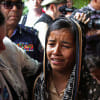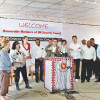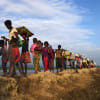UNSC weighing draft resolution
The UN Security Council is weighing a draft resolution that would pressure Myanmar to address the violence that has driven hundreds of thousands of Rohingyas to flee to Bangladesh.
The proposed resolution, drafted by Britain and France, would call on Myanmar authorities to "immediately cease military operations" and allow refugees now living in makeshift camps in Bangladesh to return, according to the text obtained by AFP on Wednesday.
The six-page text does not threaten sanctions, but lays out a series of concrete demands.
But diplomats said the draft resolution, which would be the first formal response from the top UN body, faces strong opposition from China and they expect tough negotiations ahead to reach any agreement.
"The Chinese are not on board," said a Security Council diplomat, speaking on condition of anonymity. "They want us to say nothing and do nothing on this issue."
China, a supporter of Myanmar's former ruling junta, maintains that it is using private channels to pass on the message that the violence must end and the refugee crisis must be addressed, according to diplomats.
In late September, the UN Security Council failed to take any concrete action against Myanmar due to opposition by China and Russia.
Since late August, more than 603,000 Rohingya, over half of them children, have fled an army campaign in Myanmar's Rakhine state that the United Nations has denounced as ethnic cleansing. The refugees are living in dire conditions under tarpaulins and in tents in muddy camps, the Unicef said on Wednesday.
Myanmar authorities say the military operation is aimed at rooting out Rohingya militants who staged attacks on police posts two months ago.
Meanwhile, a top Red Cross official has described the humanitarian crisis affecting the Rohingya as unprecedented and said the world was failing in its response.
Speaking to the Guardian on a visit to the rapidly expanding refugee camps in Cox's Bazar, the head of the International Federation of Red Cross and Red Crescent Societies, Elhadj As Sy, said a political solution was needed and called for all leaders "without exception" to take the situation seriously.
In another development, president of the 72nd session of the General Assembly, Miroslav Lajčák, has said the UN would extend all-out support to Bangladesh in addressing the Rohingya crisis.
He gave the assurance when Dipu Moni, chairperson of the Parliamentary Standing Committee on Foreign Affairs, met Lajčák at the UN headquarters in New York yesterday, according to a UN readout.
LIST OF DEMANDS
The draft Security Council resolution condemns the violence in Rakhine and attacks by Rohingya insurgents, while expressing "grave concern that the Myanmar security forces and vigilantes have been responsible for human rights violations and abuses."
It calls on Myanmar to allow humanitarian aid workers safe access to Rakhine, where the Rohingya who managed to escape the army campaign are now fleeing amid dire food shortages, AFP reports.
The draft resolution also demands that UN rights investigators be allowed access to Rakhine to report on allegations of atrocities, and calls for the appointment of a UN special adviser on Myanmar.
And it urges Myanmar to implement the recommendations of a commission led by former UN chief Kofi Annan that said the Rohingya should be granted citizenship rights.
The 1.1 million Rohingya Muslims have faced decades of discrimination in Buddhist-majority Myanmar and have been denied citizenship since 1982, which has effectively rendered them stateless.
Rights groups have accused the Security Council of dragging its feet on Myanmar and are calling for tougher measures, such as an arms embargo and targeted sanctions against those responsible for the attacks against the Rohingya.
Addressing the General Assembly's committee on human rights, UN special rapporteur Yanghee Lee of South Korea said the council should adopt a "strong resolution" to tackle a potential threat to the region.
"The crisis in Rakhine state has not only been decades in the making, but has been spilling over and continues to spill over beyond Myanmar's borders," said Lee.
"For a very long time now, this issue has not been simply a domestic affair."
A recent report by the UN human rights office accused Myanmar of seeking to permanently expel the Rohingya by planting land mines at the border with Bangladesh where the refugees are sheltering.
UN rights officials spoke to refugees who gave accounts of soldiers surrounding homes and firing indiscriminately as residents ran for their lives, and of uniformed men gang-raping women and girls.
'UNPRECEDENTED NOT ONLY IN SCALE'
Myanmar has blocked most international agencies, including the UN, from parts of northern Rakhine state, where security forces are accused of raping and massacring Rohingya Muslims, the Guardian reported yesterday.
The Red Cross has been allowed to provide emergency assistance to tens of thousands of people inside the country since 25 August, when the violence began, but the exodus of hungry and exhausted Rohingya has overwhelmed staff.
The organisation is appealing for $33m (£25m) to fund operations in Myanmar and neighbouring Bangladesh.
"We are facing here a crisis that is quite unprecedented not only in scale, but in the depths of the multiple deprivations that people are facing," the British newspaper quoted Sy, the Red Cross head, as saying.
"The Red Cross has greater access than anybody else [but] the whole response cannot be shifted to the shoulders of Red Cross alone. There should be access for other humanitarian actors. As proud as we are of what we do as a movement, I don't think we're responding to the scale and magnitude of the problem."
He said he was shocked and saddened to see the state of the refugees arriving after days of walking to reach the border.
"A state of deprivation. It's hunger, fear, exhaustion. I hesitate to put a word on it. A horrible state. You see almost the unbearable look of a total destitute person in need. It is almost unbearable," he said. "We have seen terrible refugee situations …but this is very different."
As international pressure has intensified -- the US said this week it was considering economic sanctions -- Myanmar and Bangladesh have begun talks on repatriation. Many Rohingya want to return home, but only if their safety is ensured.
Thousands of Rohingya continue to arrive in Bangladesh each day, but Sy said there was still hope for a political solution to the crisis.
"Ideally political solutions should have been found to the problem so that we minimise the factors that are really pushing people on the road of exodus because home is no longer safe," he said.
"We are calling always for humanity to prevail, but of course it's a political debate that is in the hands of political leaders to have the responsibility and we hope that they will take it seriously. All of them. And I mean all of them. At the national level as well as international level."
UN REJECTS MYANMAR CLAIM
A UN settlement program, UN-Habitat in Myanmar, yesterday rejected a state media report that it had agreed to help build housing for people fleeing violence in the northern Myanmar state of Rakhine, where hundreds of thousands have been displaced by the army crackdown.
The development underscores tension between Myanmar and the United Nations, which in April criticised the government's previous plan to resettle Rohingya Muslims displaced by last year's violence in "camp-like" villages.
The state-run Global New Light of Myanmar newspaper said yesterday that UN-Habitat had agreed to provide technical assistance in housing displaced people in Rakhine and the agency would work closely with the authorities to "implement the projects to be favorable to Myanmar's social culture and administrative system".
But Stanislav Saling, spokesman for the office of the UN resident coordinator in Myanmar, told Reuters in an email that "no agreements were reached so far" after the agency's representatives attended a series of meetings with Myanmar officials this week in its capital Naypyidaw.
The United Nations' principles state that all refugees or displaced persons have the right to return to property or land from which they were arbitrarily or unlawfully removed.

 For all latest news, follow The Daily Star's Google News channel.
For all latest news, follow The Daily Star's Google News channel. 






Comments